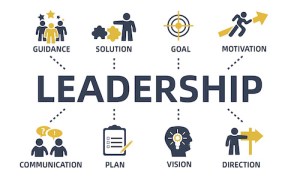The 8 Rules of Service Leadership



Service leaders are a key part of any organisation. Check out our latest blog to find out why service leaders can make or break a business.
Salesforce EMEA
Service leaders are a key part of any organisation and in the current landscape their role is particularly important. It’s vital that service leaders have a strong understanding of current best practices and successful ways of working.
The Service Leader’s Guide to Resiliency
Learn how to empower your team and centre around your customers.

What are the responsibilities of a service leader?
The main responsibility of a service leader is to manage service teams and ensure that the tools and processes they use are efficient and effective. It’s a broad remit, involving not just people management, but process management. In practical terms, this translates to:
- Using forward planning to anticipate customer demands
- Handling the challenges posed by external factors such as the COVID-19 pandemic and the pivot towards remote working
- Increasing customer engagement and satisfaction by improving internal procedures
Why are service leaders important?
An organisation’s product or service may be outstanding, but if the customer’s experience of it is subpar, everything else fades into the background. Satisfied customers become advocates. But dissatisfied ones are more likely to share their experiences and they have many channels to do so.
Customer service is the backbone of any business, especially in the current moment. Customer-centricity has become a top priority. It’s down to service leaders to shape the reputation of their company by leading their teams effectively and developing intuitive, efficient processes for solving customer problems.
The 8 rules of service leadership
When coming up with strategies for creating effective service leadership, it’s important that service leaders keep some key principles in mind. We’ll call these ‘The 8 Rules of Service Leadership’.
1. Guide by example
Aim to inspire the service teams you lead by acting as a positive role model and embodying company values in everything you do. An organisation’s ethics are becoming increasingly important to its customers and employees, and leaders should exemplify the qualities they want to nurture in the workforce. Additionally, the 4th edition of the State of Service report reveals that:
- 76% of service and support staff state that communication is very important
- 71% say that listening skills are very important
- 62% say that adaptability is very important
It’s no surprise that agility is appreciated in a landscape littered with new obstacles. Soft skills like empathy and listening are prized in a potentially stressful climate. Service leaders who display these skills can guide by example.
2. Good solutions put the customer first
Nearly every customer is digitally savvy, rapidly changing expectations for service. In fact, the State of the Connected Customer report shows that 82% of customers now expect to solve complex issues at first contact. Moreover, the 4th State of Service reveals that 83% of service teams have changed their policies to be more flexible with their customers.
Ensuring that the customer is at the heart of everything you do – and communicating this focus to the teams you manage – will help you to make sound operational decisions in an increasingly customer-centric era. Developing new, customer-focused metrics is one way to raise the bar for great service. Consider KPIs based around satisfaction rather than volume.
3. Meet goals by leveraging smart data and connecting teams
To get insights into what makes your customers tick, and what they want from you, you’ll need to use the data you collect intelligently. Consider using a data management system such as Salesforce Customer 360, which allows you to combine learnings from marketing, commerce, and service operations to meet your goals.
If you are not implementing new technologies and leveraging data to keep up with the changing landscape, you are likely falling behind. The State of Service shows that:
- 81% of decision-makers are accelerating digital initiatives
- 87% of service professionals say that customers are using digital channels more
- 79% of service professionals say that it’s impossible to provide great service without a complete view of the customer’s interactions
Service organisations can use digital solutions to smash silos and connect teams, and leverage AI technologies like Einstein Analytics to track the productivity of remote agents.
4. Motivate your team by empowering them to make decisions
Rather than leading in a top-down way, make your teams feel that they are involved in a common goal of improving customer satisfaction. If employees feel that they have a stake in the processes they perform, they are more likely to make great decisions.
You never know where the next great solution or game-changing suggestion might come from, after all. W.L. Gore, of Gore-Tex fame, even gives its employees ‘dabble time’ to brainstorm new ideas.
More and more service organisations are embracing this idea of intrapreneurship or ‘mini-CEOs’, where data is democratised, agents can see their metrics in real time, and everyone can track company-wide goals and blaze their own path towards meeting them.
5. Communicate openly
It’s important to make time to connect with your teams, and to listen to their feedback with an open mind. If you don’t know what challenges they’re facing, how can you help? A good place to start is by surveying your team to get an understanding of how they’re managing in this climate, both in the workplace and outside of it.
At a time when 81% of agents describe their customers as being more anxious and 75% say they’re more demanding, service leaders need to try and lower the emotional burden on the workforce.
When supporting employees through difficult times, such as returning to the workplace after the COVID-19 crisis, consider using Work.com. The Command Centre in Work.com offers businesses a range of tools and resources, including a contact-tracing tool that respects users’ privacy and sensitively gathers data.
6. Plan to invest in people
Offering relevant training, including upskilling or reskilling, can help employees fulfil their potential and keep up with the changing expectations of today’s customer. The new normal requires new ways of working, so leaders need to make sure that their teams have the proper training to succeed. The State of Service shows that:
- 77% of agents say their role is more strategic than it was two years ago
- 55% say that they need better training to perform their role well
- 79% of decision-makers are making significant investments in agent training
It’s clear that the role of reps is evolving. Fortunately, on-demand training programmes are becoming more popular, so service reps can skill up even while working from home. For today’s service leaders, investing in people is imperative.
7. Create a vision for continuous improvement
Just because something has always been done a certain way, that doesn’t mean it’s the best way. Always look out for ways to improve and polish existing processes, and ask your teams to do the same.
By adopting new strategies, implementing cutting-edge technologies and encouraging teams to share their own ideas for solutions, service leaders can create a culture of innovation and continuous improvement. The changes don’t have to be huge – even small changes can help to oil the gears of inspiration and innovation.
8. Strong direction is critical, especially in uncertain times
Service teams need the right skills and strategies to succeed in a competitive landscape, but they also need strong direction. The uncertainty of the current climate demands leaders that can steer a ship towards shore, even through choppy waters. Building agility, nurturing a sense of purpose, and empowering the workforce with digital solutions can help today’s service leaders become world-class directors.
As Jack Welch, former CEO of GE, once said, “Before you are a leader, success is all about growing yourself. When you become a leader, success is all about growing others.”
Leading towards a better future
Both businesses and customers depend on effective service leadership – now more than ever. Having ineffectual or inefficient service leadership not only leads to dissatisfied customers, it can lead to an unmotivated workforce. Good service leaders inspire the workers, and they give them the tools they need to succeed. Put the 8 Rules of Service Leadership into effect today, and create a stronger workforce for tomorrow.
To see more about how service leaders are adapting to today’s challenges, check out The Service Leader’s Guide to Resiliency.
The Service Leader’s Guide to Resiliency
Learn how to empower your team and centre around your customers.



















![Generative AI is about to take service operations to the next level of efficiency and personalisation. [girafchik123 / Getty Images]](https://www.salesforce.com/eu/blog/wp-content/uploads/sites/14/2023/09/3-ways-generative-ai-will-reshape-customer-service.jpg?w=300)


